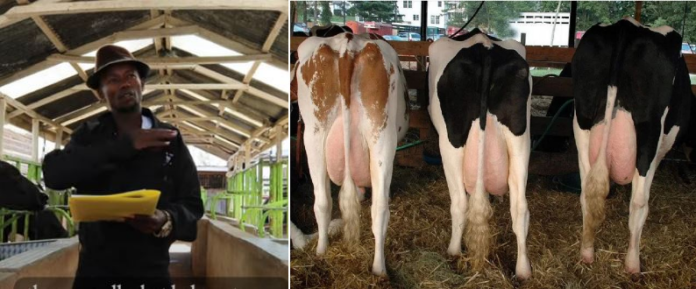Kanyoni is the founder and CEO of Hazard Eden Farm, a dairy farming enterprise in Githunguri Kiambu County.
In his 40 by 50 farm, Kanyoni owns hundreds of cows of various breeds that produce up to 45 litres of milk per day each.
What sets the farmer apart from other farmers in the region is the lack of use of silage to feed his cattle.
Instead, he has adopted a system that emphasizes natural grazing and nutrient-rich diets, ensuring the health and vitality of his herd.
”I don’t use silage because I consider my customers who may not afford these feeds. If you sell a cow used to silage to a poor farmer, it might get back to your farm due to reduced production.”
”I normally feed the cattle nappier grass and hay,’’ he says, adding that most of his customers don’t like cows on silage.
Through these feeds,Kanyoni notes that he is able to get 12,000 litres of milk per month. He sells the milk locally in various companies including Fresha, with the rest exported to other African countries including Uganda and Tanzania.
Naomi Ruhara: My dairy farm producing 400 litres daily has made me rich in my 30s
Despite being a large-scale milk producer, Kanyoni says he does not use milking machines on his farm.
He says this was necessitated by a past experience when he encountered blood in milk after one of his workers used the machines for milking.
Besides milk production, Kanyoni also trains people interested in dairy farming at a cost of Sh5,000 per person. The trainings are conducted every month and takes four days.
According to experts, for profitable dairy farming, farmers need to feed their cattle with the necessary minerals.
Farmers can grow different types of grass like Napier grass, brachiaria, lucerne and desmodium which are mixed to make cows produce more milk.
A Friesian cow which is ranked as the best yielder feeds more compared to the other breeds and eats about three per cent of its body weight of dry matter.
Deworming should also be done regularly, first when it is two to four months then with intervals of every three months, for maximum production.
Calves are dewormed monthly. After deworming the farmer goes for 72 hours without using its milk as it is not fit for human consumption.
Good hygiene is essential when milking cows by ensuring hands and clothes are clean and the farmer is in good health.











